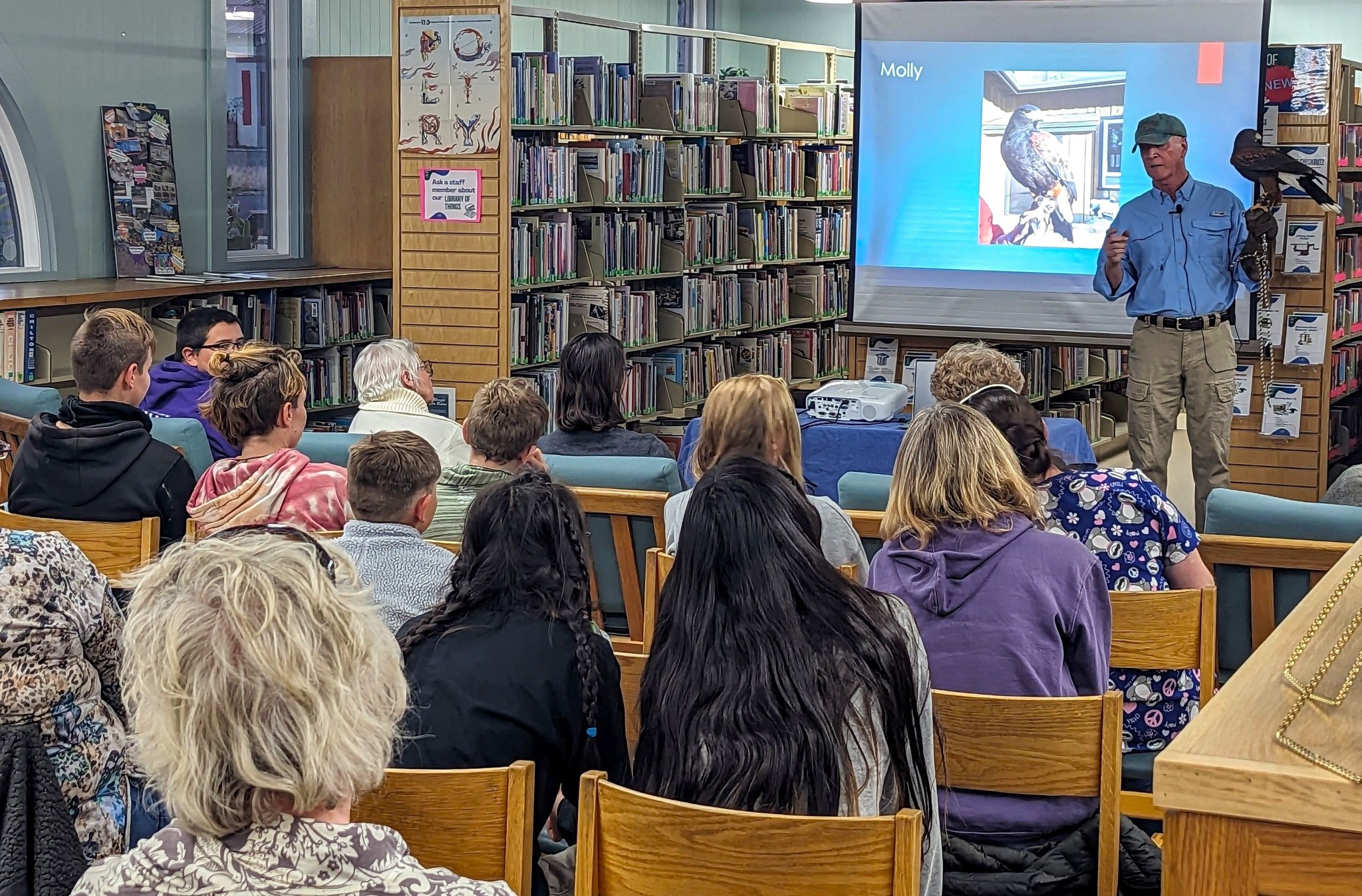
By AMANDA WALDROUPE/Oregon Arts Watch
During the celebration of Maupin’s centennial anniversary last year, its public library – the Southern Wasco County Library – printed a second edition of Chaff in the Wind: Gleanings of the Maupin Community.
Chaff in the Wind is a history of Maupin and Wasco County that the library’s Friends’ group originally published in 1986. The library commissioned new chapters covering Maupin’s history since then.
Another era also needed to be added: There was nothing about the region’s history before white people settled there, even though Native Americans had lived in the region for hundreds of years. So, Valerie Stephenson, the library’s director, reached out to the Confederated Tribes of Warm Springs.
Delson Suppah, the Warm Springs’ cultural program coordinator, agreed to contribute – but not through writing a book chapter. Like many Indigenous cultures, the Warm Springs tribe conveys its history through oral storytelling. In two events, Suppah gave an oral history of the Warm Springs tribe’s history and presence in the area.
A grant – in this case, $4,000 from Oregon Humanities – paid for the events and republishing the book. Without the grant, Stephenson said, none of it would have happened.
For the third year, Oregon Humanities will distribute $25,000 in mini-grants to Oregon’s rural libraries to fund programs and events in 2024.
Oregon’s public libraries are well loved and well used, with one of the highest per capita circulation rates in the country. Public libraries are among the last institutions that are free and open to the general public, making them a natural gathering space for adults and children.
“I think of it as the meeting place of the community,” Cheryl Hancock, the director of Harney County Library in Burns, said. “A library is the heart of the community.”
“It’s a really easy grant application,” said Dawn Smallman, Oregon Humanities’ grants and program coordinator. “We’re super hands-on to help folks get it.”
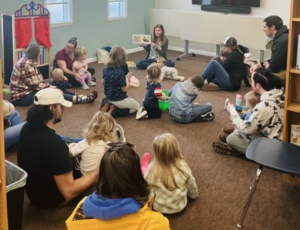
With library services expanding at a time when traditional funding for public libraries is growing more and more unreliable, Oregon librarians say that grants are crucial in order to fund programming, events, and other services.
Libraries have always played a critical role in early literacy: teaching kids how to read, hosting summer reading programs, and reading and story time events for different age groups. Libraries were also early adopters in providing free access to computers and fast, broadband internet.
Even before the COVID-19 pandemic prompted libraries to begin offering virtual and online services, libraries’ services were expanding to take on roles that blend information literacy, social, and community services.
Library staff are increasingly being trained in basic mental health crisis response and how to administer Narcan or naloxone to people experiencing an opiate overdose. To serve growing numbers of immigrant communities, libraries are acquiring books in languages other than English, bilingual books, and hiring staff who speak languages in addition to English, especially Spanish.
In many communities, libraries are a place where people experiencing homelessness can spend the day, where senior citizens find social interaction, and where kids can go after school.
“Libraries are places where people from all different backgrounds can interact,” Buzzy Nielsen, a program manager for the State Library of Oregon, said. “You see a big cross-section of your community.”
That is especially the case in rural Oregon, where libraries are often the only place that host arts and cultural events.
“We’re it,” Stephenson, of the Southern Wasco County Library, said. The library serves all of southern Wasco County, a 942-square-mile area with approximately 2,500 residents.
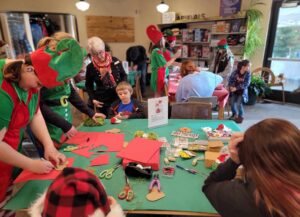
Recently, “families came in the hordes” to a craft night, during Maupin’s Holiday Festival. More than 200 people crowded into the library, sitting at six craft tables. The library gave out 65 copies of How the Grinch Stole Christmas, running out of books and craft supplies by the end of the night.
The library has hosted author and music events, including the Portland Taiko Drummers. Like many rural libraries, it has a conference room large enough to host governmental, board, and other community meetings. The library hosts social workers from the Wasco County Health Department, who come to meet with residents and process applications for the Oregon Health Plan, SNAP benefits, disability, and other services.
“To me, our mission is to reach out and provide a lot of different types of services for the community,” Stephenson said. Otherwise, Wasco County residents seeking arts and culture or other services would have to drive to The Dalles or Portland. “A lot of people can’t afford that,” she said.
Clatskanie is “just far enough away” from Astoria and Portland that it has prompted Maryanne Hirning, director of the Clatskanie Library District, to expand the library’s offerings. “We want to be the community hub,” she said. “I want everyone to find something at the library.”
“They really are hubs of arts and culture,” Smallman said of Oregon’s rural libraries.
Bridging gaps
As rural libraries increasingly “bridge that cultural gap,” Stephenson said, they have undergone dramatic evolution and are no longer eerily quiet places to peruse and read books.
“If we wanted to just be storage for books, our circulation would go down,” Hancock said. “Libraries have had to pivot.”
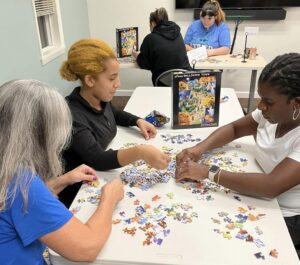
Clatskanie’s library has started a young adult book club and hosted classes on flower arranging and cookie decorating, both taught by local business owners. The library displays artwork by local artists, thus acting as an art gallery.
With a private donation, the library bought enough Legos and blocks to start a Lego Club, which is often hosted in the library’s makerspace. Many libraries now have “makerspaces,” where blocks, arts and craft materials, and other hands-on materials are set out for children.
In Clatskanie’s 2,500-square-foot library, it is a common to see “30 kids running around the library” and building with Legos, Hirning said, laughing.
Libraries have also created Libraries of Things, where patrons can check out items ranging from e-readers with pre-downloaded e-books; ukuleles and other musical instruments; pots, pans, and other cooking equipment; fishing poles; and for kids, telescopes and science kits.
Numerous libraries also check out cultural passes. Created in collaboration with museums, arts, and culture organizations, the passes act as free admission tickets for individuals and families.
Clatskanie’s library began offering cultural passes in September. Patrons can check out passes to visit Newport’s Oregon Coast Aquarium, the Portland Art Museum, Columbia River Maritime Museum, and Evergreen Aviation Museum.
Libraries of Things reflect their community. Harney County’s library checks out canners, dehydrators, and other items necessary to preserve food.
Wi-Fi hotspots are another common offering. Stephenson, Hancock, and others said the availability of fast, broadband internet in rural Oregon can be nonexistent.
“We have a lot of people who are below the poverty level and cannot afford monthly internet fees,” Hancock said. “We have a lot of spots that aren’t served by internet companies.” The library’s 10 Wi-Fi hotspots are always checked out with holds placed on them. “They are hugely popular,” she said.
In Southern Wasco County, the library’s 10 Chromebooks with built-in hotspots and an additional 10 hotspots are, Stephenson said, “all checked out.”
With the expansion of library services, circulation has dramatically increased for a library’s most fundamental offering – books. Hirning said book circulation has increased by 400 percent. Other librarians say that once someone attends an event at a library, they are more likely to consider other services the library offers, become a member, and check out books.

At the same time demand for libraries has increased, they have become caught in the crosshairs of politics.
The number of challenges to books – attempts to restrict access to certain books or altogether ban them from libraries – is the highest since the American Library Association (ALA) began gathering data. Last year, there were almost 1,300 attempts to ban books, nearly double the number from the prior year. The majority of contested books, the ALA notes, are about race, sexuality, or gender.
According to Nielsen of the State Library of Oregon, 93 books were challenged in 46 different libraries. “It pales in comparison to other states,” Nielsen said, but it is the highest number since the state library began tracking data in 1987.
Oregon’s libraries, especially in rural communities, routinely face the threat of closure due to lack of revenue.
The most high-profile instance was in Douglas County, which eliminated funding for its 11 county-run public libraries in 2017. Roseburg’s library reopened reopened with city funding, in partnership with the Douglas Education Service District. Two other libraries in the county, in Drain and Reedsport, reopened after creating new taxing districts; other Douglas County libraries are largely run by volunteers
In 2018, Wallowa County, in northeastern Oregon, eliminated county funding for its libraries. Libraries in Enterprise, Wallowa, and Joseph now operate as separate entities.
A library’s funding is often stitched together from county and city dollars, tax district revenue, donations generated through a Friends group. Those funds often cover operational and administrative costs, but funding for any additional programming often comes from elsewhere.
“A lot of times, you have to get creative,” said Laura Kimberly, the director of the Newport Public Library. “If you don’t have a Friends group or a foundation … finding grants becomes more and more important.”
A plethora of foundations and organizations regularly provide grant funding, both national and local, including the American Library Association; the State Library of Oregon, The Roundhouse Foundation, Oregon Community Foundation, the Oregon Cultural Trust, and The Ford Family Foundation.
Grant and foundation support was instrumental in reopening Roseburg’s library in 2018. The Oregon Community Foundation awarded the city more than $100,000. The Ford Family Foundation matched that amount.
The Oregon Community Foundation has provided grant funding to libraries since its founding in 1973. Since 1990, the Foundation has distributed $41 million in grant funding to libraries throughout Oregon. In 2015, the foundation funded the first Oregon Public Library Needs Assessment. Drawing from the assessment’s recommendation, the foundation started the Oregon Public Library Innovation Fund.
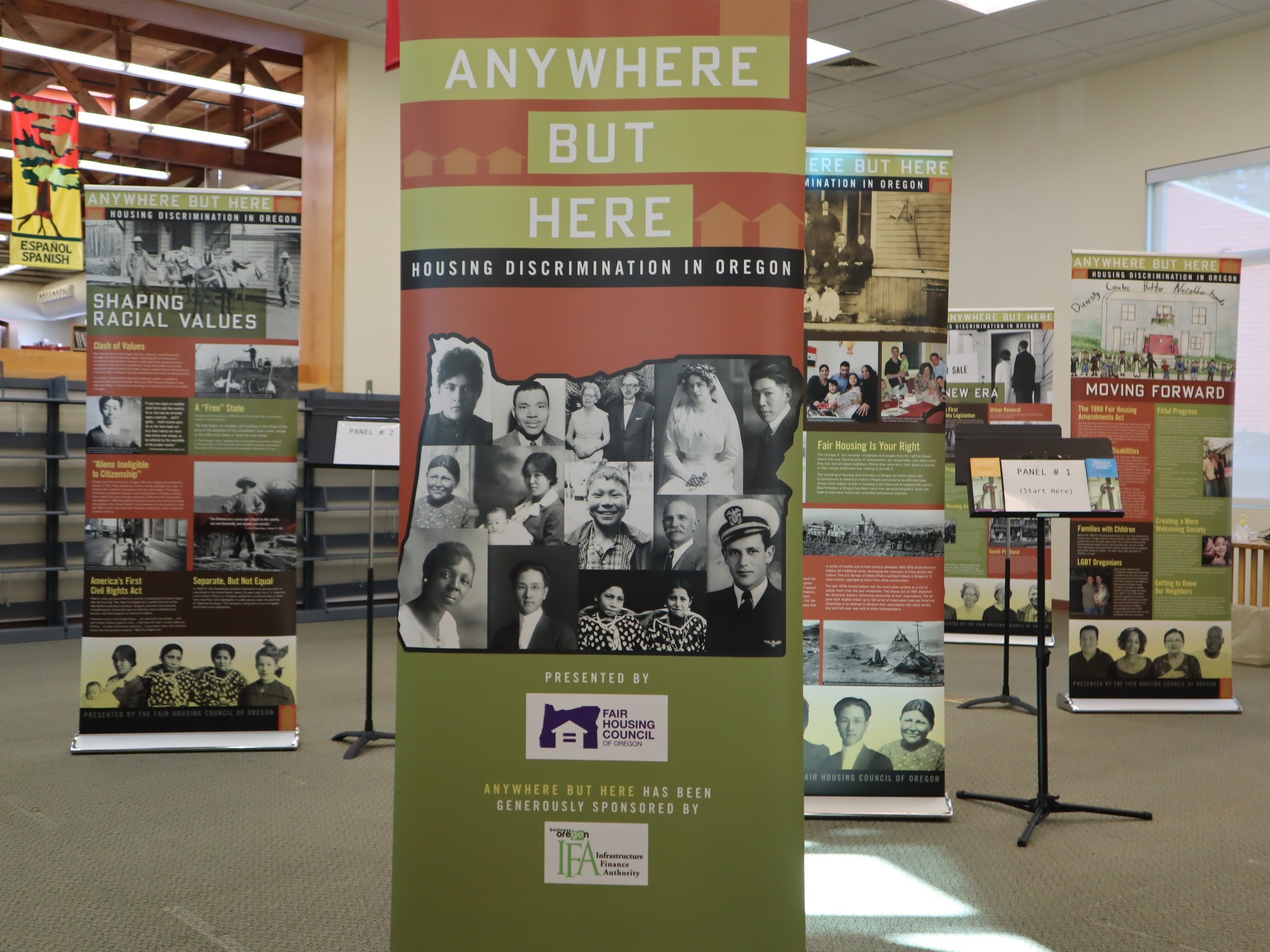
Foundation funding
With the mini grants given out by Oregon Humanities last year, rural libraries hosted events from author talks to roundtables on hot-button political issues.
Columbia Gorge Community College’s library, located in The Dalles, received $3,810 to co-host two lunchtime events. The first discussed the college’s role as a Hispanic-Serving Institution; the second on transgender rights and the experiences of the college’s transgender students.
Forest Grove’s library received $1,250 to host two online events. One featured the founder and executive director of the Oregon Remembrance Project, who gave a presentation about a lynching that took place in Coos Bay in 1902 and Oregon’s legacy of racial violence.
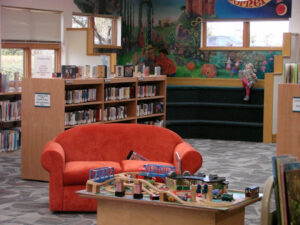
In Newport, Kimberly sought to solve two issues with the mini-grant her library received. Nearly a third of Newport’s population is non-white, including large Indigenous and Latino populations. Kimberly said there are growing numbers of Latino, Chinese, Japanese, Ukrainian, and Russian immigrants living in the Newport area.
Kimberly said numerous Newport residents also experience food insecurity.
With its grant from Oregon Humanities, Newport’s library offered cooking classes featuring the traditional cuisine of the city’s minority communities. One person taught a class on making Japanese dumplings, and a person from Guatemala taught a class on making pupusas. Kimberly taught a class on Jewish cuisine.
The classes compliment services already offered by the library, including a food pantry, made up of donations from private citizens, grocery stores, and social service organizations, and garden beds where the library hopes to plant its first garden this coming spring.
“Food bonds people,” Kimberly said. She said it has helped Newport’s immigrant communities feel more comfortable and welcome in using other library services – including checking out books.
Oregon Humanities’ mini-grants will fund community events and programs relating to the theme “fear and belonging,” which Oregon Humanities chose as its theme for 2024 events. On its website, Oregon Humanities listed suggested topics related to the theme, including: Who is currently included in our democracy, and who is left out? Why do we sometimes fear people who are different from us or don’t belong to the same groups we do? What brings us together and what drives us apart?
Oregonians will be able to ask and answer those questions in a place where, no matter how much it changes, one can seek knowledge — the library.
- Oregon ArtsWatch is a Portland-based news nonprofit that focuses its coverage on the arts and entertainment. This story is part of a series that profiles essential cultural hubs, prioritizing centers in rural and underserved areas, and examines how they uniquely serve and reflect their communities.




















